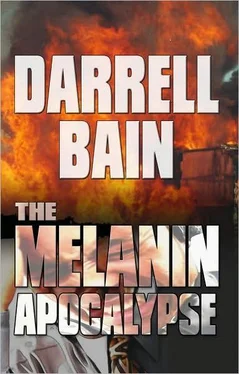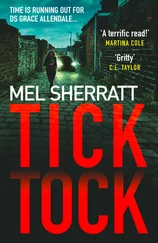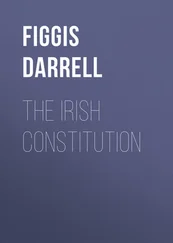He pushed open the basement door and stopped in his tracks. A short, well muscled white man was dragging a body away that still had a knife hilt protruding from its back. Doug reacted almost immediately, but still almost lost his life. The moment he drew his gun and yelled “Stop!” the man dropped the body and flung himself sideways. He rolled, drawing a pistol and firing at the same time Doug did. Both of them missed with their first shots, but the other man was moving and Doug wasn’t. He was able to take better aim. His second bullet cratered the man’s forehead.
Doug knew there had to be someone else around. Assassins coming into a facility like this one wouldn’t be working alone—and he knew intuitively that they must be after Johannsen. He ran for cover as soon as he saw that his shot had gone true. Gunfire rang out from behind an idle forklift as he ran. His quick movement saved him, but he didn’t get away free He took a bullet in his upper left arm and as he fell, another in same leg where he had been wounded before. His assailant made a single mistake; he came out from cover too soon, thinking he had done a complete job.
Doug had hung on to his pistol as he went down, knowing that if he dropped it, he was dead. He got off a quick snap shot that startled the gunman, then another that thudded into the man’s stomach. He gasped and fell backward, clutching his middle. Doug approached cautiously, his left arm dangling numb and useless and limping from renewed pain in his leg. He looked first at his fallen foe, then around, then back at the sprawled figure of the man he had shot. He lay on his back with his arms outflung, twitching and sucking air as if trying to breathe. His weapon lay nearby, a small automatic. An assassin’s weapon. He knew now why the two bullets hadn’t done him more damage.
Doug appropriated the other weapon, frisked the man awkwardly but quickly with one hand, then began searching for Johannsen. He found him in the third room he investigated. Doug didn’t know at first which was the prisoner, but one of the men was certainly dead. He hoped it was the federal marshal. He bent over the other man and saw that he was still alive, though he had been shot through the chest. Somehow, it must have missed his heart and lungs for he stared hopefully up at Doug with glassy blue eyes set below long hair as yellow as ripe corn.
“Are you Savak Johannsen?”
“Yes. I’m hurt.” He breathed heavily. “Get a doctor.”
“In a minute. Tell me where the financing for the Harcourt virus came from.”
“It was your CIA. The director; I saw his name on some… documents.”
“What documents? Where?”
“I’ll tell you. A doctor, please.” His voice was weakening.
Doug needed proof. “Where are the documents? What did you see?”
“Shane Stevenson. Charleston. House. In…” His eyes rolled up and he lost consciousness. Doug thought of rushing up the stairs to find a doctor to try saving the lives of the men still breathing, but doubted he would make it. He was beginning to feel woozy from his own wounds. He used his phone, but didn’t know the number of the treatment facility where he might find a doctor and had neglected to plug it into his phone’s memory. He called his own battle headquarters. As soon as he got an answer he recognized Teresa’s voice. He said “Teresa. Doug here. There’s been a gun battle in the basement of the Science Center. Someone tried to take Johannsen out. Send a doctor and two—no, make that three gurneys; I’m hit, too. And hurry. If I’m not responding by then, Johannsen is still alive in his room and one of the gunmen is lying out in the open by the forklift that you’ll see as soon as the elevator opens.”
“Got it, Doug. Hang on; I’ll have someone there in a few minutes if I have to carry them on my back!”
Thank God Teresa wasn’t making rounds, he thought. She would have help here quickly. He limped back to the elevator and removed the chair that was preventing the door from closing. then sat down nearby. He leaned against the wall and examined his wounds. The upper arm was the worst; blood was still flowing copiously from it. The dizziness began enveloping him again. He unbuttoned his fatigue shirt and pushed the left side lapel over to add another layer of cloth to the wound, then lay down on that side, even though it hurt. He hoped the pressure would slow the bleeding. Then the world began spinning and his awareness faded.
I want that Johannsen character brought to Washington so we can try him and execute him publicly, like we did those others,” President Marshall said.
Edgar Tomlin couldn’t agree more; he wanted him dead in the worst way. He had begun feeling relatively safe after the white supremacist gang that helped Johannsen had been executed in such a hurry that there had been little time to question them. Even so, it had been a near thing, with Rafe Smith yelling out an accusation at the last moment. Fortunately, he hadn’t been understood and the firing squad ended any further chance of him talking.
There’s such a thing as being too damned efficient, Tomlin muttered to himself, thinking of how the president had insisted on Johannsen being taken to the CDC immediately after capture. It had been nothing more than wild political reasoning, thinking that if he were in custody, and working under guard to reverse the effects of the virus he had created, then the government would be absolved of blame. Tomlin thought he had Johannsen taken care of when the porch monkeys in Atlanta responded to the rumor that the CDC was harboring a cure—with his personal agents helping to spread it—but that hadn’t worked either. The blacks reacted like he thought they would, but the army had gotten there too fast, and the thin CDC security force had put up an admittedly heroic resistance. After that failure, he had sent the last two agents he could personally call on in Atlanta to finish off Johannsen for good.
He looked at his watch. By now, that matter should finally be taken care of. “I’ll see to it, Mr. President.
And I think executing him is a good idea.”
“I’m not so sure,” Lurline said. “Wouldn’t he be more valuable alive, so he could be forced to help find a cure or a vaccine? After all, he created it; he should know more about it than anyone else.”
“If the nation gets out of this with a whole skin, the sonofabitch did the world a favor,” General Newman said, forgetting momentarily that Lurline was in the room with them. Goddamn broads. They got no more business in government than they do in the army, he thought, waiting for the outraged response his remark was sure to evoke.
Lurline felt more like crying than arguing. How did a man like that get to be Chairman of the Joint Chiefs?
And the president wasn’t rebuking him, either. “You can’t mean, that, General,” she said. Beneath the conference table her fist clenched the hem of her skirt to prevent her nails from digging into the palm of her hand.
“No, of course not. I was just thinking in military terms, our oil supplies and so forth.”
Sure you were , Lurline thought. Aloud, she said “Mr. President, Vice President Santes has been in contact with Colonel Christian and Doug Craddock, the security chief at CDC. They’re negotiating with Qualluf Taylor as we speak.”
Marshall nodded approval, but he had more important things on his mind. Like China, Korea and the Middle East. Which reminded him. “Have you talked to Willingham again?” The president had decided that their meetings could do without his physical presence unless he had something urgent to say. He didn’t like the man’s patronizing air of superiority, as if anyone who hadn’t graduated from Harvard was automatically incapable of understanding how the establishment worked. Of course he had been taken down a peg when the U.N. headquarters was demolished by a mob of blacks, but that wouldn’t last. His kind thought they should be running the world and that everyone else was incompetent.
Читать дальше

![Nick Cracknell - The Quiet Apocalypse [= Island Zero]](/books/28041/nick-cracknell-the-quiet-apocalypse-island-zero-thumb.webp)










